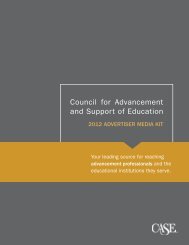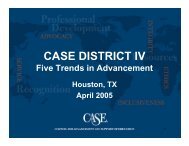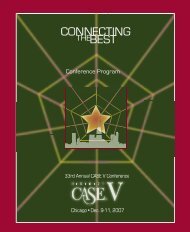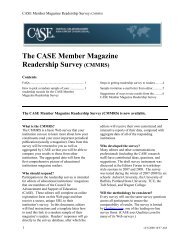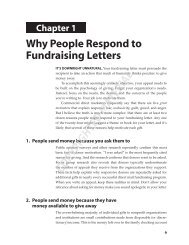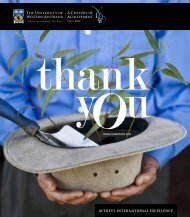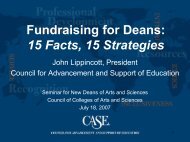You also want an ePaper? Increase the reach of your titles
YUMPU automatically turns print PDFs into web optimized ePapers that Google loves.
class nOTES<br />
Understanding the Faked Orgasm<br />
The orgasm—yes, the orgasm—plays an<br />
important role in our lives and helped<br />
shape the development of the species.<br />
It’s best not to leave everything we know<br />
about it to bar talk and magazines.<br />
Erin Billie Cooper ’04 has ushered the orgasm into<br />
the realm of science with her study, begun at <strong>Kenyon</strong>,<br />
of heterosexual women who occasionally fake it.<br />
“Studies have found that between 50 and 68 percent<br />
of women have faked an orgasm at some point in their<br />
lives, but until I started my research, we never knew<br />
why. All the evidence was anecdotal,” said Cooper, a<br />
fourth-year graduate student in clinical psychology at<br />
Temple University.<br />
Cooper developed an assessment measure that<br />
unveils motives behind the behavior. She used it to<br />
survey 481 women between the ages of eighteen<br />
and thirty-two who endorsed faking orgasms. “The<br />
common assumption is that women do this to protect<br />
the man’s ego because they don’t experience a<br />
real orgasm, but women fake orgasms for a variety<br />
of reasons.”<br />
One motive is indeed to protect a partner’s feelings.<br />
But others include insecurity about sexual functioning<br />
and the desire to end the sex act quickly. Some<br />
women fake orgasm to<br />
enhance their sexual<br />
experience. “These<br />
women are never<br />
talked about. They are<br />
taking control of their<br />
sensuality and ensuring<br />
that they have<br />
a good time. Faking<br />
orgasm can make sex<br />
more fun and exciting<br />
for them; it has little to<br />
do with their partner.”<br />
Cooper’s research, which has attracted national<br />
attention in the popular media, originated with girl-talk<br />
over lunch during her senior year in Gambier. “I was<br />
looking for an independent study idea and this came<br />
up as a bunch of girls were sitting around in Peirce<br />
Hall,” recalled Cooper, who is originally from northern<br />
Kentucky. “I think the conversation was triggered by a<br />
Cosmopolitan article.”<br />
Being the good psychology student, Cooper<br />
searched the literature and was surprised to find<br />
just two articles in peer-reviewed journals about the<br />
practice. Under the tutelage of Professor of Psychology<br />
Allan Fenigstein, she began collecting data from<br />
<strong>Kenyon</strong> female undergraduates and developing her<br />
questionnaire.<br />
Presentations at professional conferences since<br />
2007 have sparked a firestorm of interview requests<br />
and reports in newspapers, magazines, and Web<br />
sites. “I wonder every day if this is good for my career,”<br />
said Cooper, who hopes to continue her research<br />
in an academic or clinical career. “Most graduate<br />
students are not yet respected enough in their field<br />
to be contacted for interviews, so this has been great<br />
attention for my work. But I have some concern that<br />
it will not be taken as seriously as it should due to the<br />
interest shown by the popular press.”<br />
When people ask Cooper what she studies, she<br />
typically smiles in anticipation of their response to her<br />
answer. “I know they are going to react with shock,<br />
horror, or fascination, but for the most part people are<br />
interested, especially women. The practice is common,<br />
so there is good reason to study it.”<br />
Her work, which she hopes to publish soon,<br />
advances knowledge about human sexual behavior<br />
and can better inform therapy for individuals and<br />
couples. It even has implications for men. “They<br />
can use my research as an ice-breaker for<br />
having an open and honest conversation<br />
with their partners,” Cooper said.<br />
—Dennis Fiely<br />
’04<br />
California, won the Professional<br />
and Amateur Pinball Association’s<br />
(PAPA) World Pinball<br />
Championships in Pittsburgh,<br />
Pennsylvania, in August. Andrei<br />
tells us that his first attempt at the<br />
world title was in 1994 when he was<br />
still attending <strong>Kenyon</strong>. He writes,<br />
“All those hours I spent playing in<br />
Gund Commons finally paid off.”<br />
’96 Delia A. Kloh<br />
Charlottesville, Virginia<br />
delia1974@gmail.com<br />
Sarah Michael<br />
Long Beach, California<br />
sarahemichael@gmail.com<br />
Christopher Ellsworth<br />
Mount Vernon, Ohio<br />
ellsworthc@kenyon.edu<br />
Christian L. Ball and his wife, Anne,<br />
welcomed their new son, Maxwell<br />
Thomas Ball, in November<br />
2010. Chris and his family live<br />
in Billings, Montana. Joseph F.<br />
Herban, Columbus, Ohio, informs<br />
us that he is a top producing<br />
realtor and real estate investor<br />
in Columbus. He married his<br />
wife, Angela, at <strong>Kenyon</strong>, and they<br />
have a three-year-old daughter<br />
named Hailey. Joe keeps in touch<br />
with Michael H. Schuermeyer and<br />
Joshua H. Cornehlsen, and they<br />
jointly own ocean-front property<br />
in Nicaragua, where they plan to<br />
eventually open a youth hostel/<br />
resort home for tourists. Adrienne<br />
Biggert Morrell is still living and<br />
working in Washington, D.C. She<br />
and her husband, Jarrett, are kept<br />
very busy by their three children,<br />
Greer (five), Charlotte (three), and<br />
Anders (one).<br />
’97 Barbara Kakiris<br />
Cleveland, Ohio<br />
barbara.l.kakiris@nasa.gov<br />
R. Joseph Rodriguez, Austin, Texas,<br />
had a research article featured in<br />
the National Council of Teachers of<br />
English centennial issue of English<br />
Journal, in which he commented



